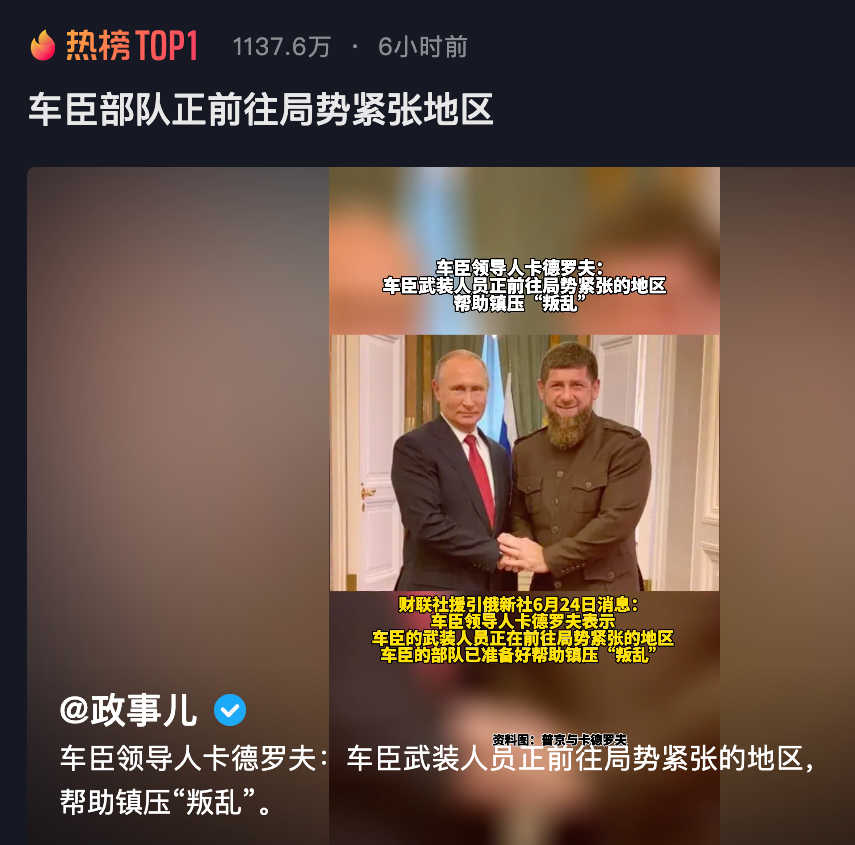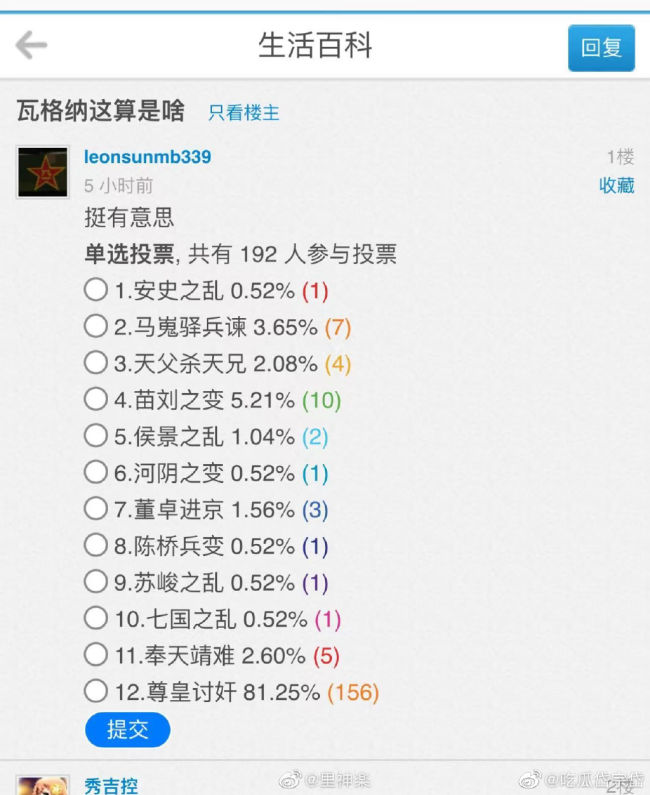Note: This article was written on June 24, 2023, as the situation in Russia was unfolding, including the Chinese responses to it at the time.
As the world is watching how Russia is facing an armed mutiny after the Wagner group accused Russia of a deadly missile strike on its troops in Ukraine, the topic is also making headlines in China, becoming a number one top trending topic in Baidu’s and Weibo’s hot search lists.
While reports on the conflict between Russian troops and the Wagner mercenaries are flooding in, the topic “Putin Accuses Wagner Head [Prigozhin] of Treason” (#普京指责瓦格纳负责人叛国#) received a staggering 1.2 billion views on the Weibo platform within just a few hours time.
The hashtag directly refers to the televised speech Russian President Putin gave earlier on on the 24th in which he mentioned how the Russian private military force Wagner was attempting to subvert Russia from within, classifying it as an act of treason and calling it “a blow to Russia” and “a knife in the back of our people.”
Chinese Online Media: A Russian Perspective
Chinese social media discussions on the evolving situation in Russia are heavily influenced by reports from Chinese state media outlets, which share the latest news and updates not only on Weibo but also on other social media platforms such as WeChat, Douyin (China’s TikTok), and others. The hashtags surrounding the news reports are also initiated by Chinese media outlets.
In their online news posts, there may not be a distinct ‘pro-Russian’ stance, but there clearly is a strong Russia-focused perspective.
Putin’s condemnation of the Wagner military has become one of the major trends in China’s online media landscape. Alongside that, discussions about Russia’s “anti-terror measures” and Putin’s phone conversations with a select few international allies regarding the latest developments are also gaining significant attention.
By early Sunday morning (China local time), both Putin’s speech and Russian media reports about the Russian army setting up machine gun positions on the outskirts of Moscow became two of the most popular hashtags on Weibo.

Another aspect that is capturing considerable attention in the Chinese online media sphere is the involvement of Putin ally and Chechen leader Kadyrov and the Chechen troops. Discussions surrounding their role in the unfolding events have become a prominent topic of interest.
On Saturday, Kadyrov called the actions of the Wagner group a military rebellion, and he promised help in putting down the mutiny.

Chechen troops heading to the tense region, this news was trending on Douyin as well.
News about the deployment of Chechen forces to the Rostov region has been extensively covered by media outlets and has garnered significant attention on Weibo. Additionally, it has emerged as a top trending topic on Douyin, further amplifying public interest in the matter.
It is noteworthy that during the live coverage on Saturday afternoon and early evening UK time, BBC World News did not mention Kadyrov at all, nor did they report about Putin’s international calls to allies.
Instead, they focused more on a Ukrainian perspective, highlighting a difference in coverage between Chinese media and Western media regarding the developments.
A Plea for Peace
A prevailing response on Chinese social media to the recent events in Russia is a plea for global peace and the restoration of stability, emphasizing a desire for calm rather than further unrest.
“A fragmented Russia would be the most dangerous destabilizing factor in the world,” remarked a Chinese commenter.
“The border line between China and Russia is very long, and the two countries are closely interconnected. I hope for peace and a quick end to all the turmoil,” another Weibo user wrote.
Others also wondered about the safety of Russia-based Chinese citizens.
“Has China started evacuating its citizens? Has the Chinese Embassy in Russia issued a warning notice?”, some netizens wondered.
There has been no announcements about safety measures taken by the Chinese Embassy in Moscow at the time of writing.
Witnessing History
Another common context in which the Wagner mutiny is discussed on the Chinese social media platform Weibo is through a historical lens.
Many commenters perceive the recent developments as a significant historical moment and draw comparisons to previous instances in history of rebellious army groups, either in China or in other countries.
An influential voice on Weibo discussing the Prigozhin-led Wagner mutiny is Hu Xijin, a political commentator and former editor-in-chief of the state media outlet Global Times. With a background in journalism and Russian Literature and Language, Hu Xijin is also well-informed about Russia and geopolitics.
In an early post on June 24th, Hu said it was still uncertain if the situation should be seen as “internal strife” (内讧) or “armed rebellion” (叛乱). Hu also suggested that if all the Wagner forces would follow Prigozhin’s defiance of Putin, the Russian defense line could collapse.
In a later post, Hu Xijin noted that traditional armed rebellions or coups d’état have been uncommon in Russian history, with palace coups being more prevalent. He therefore called the Wagner rebellion a “very unexpected occurrence,” similar to historical instances of regional military leaders challenging central authority in ancient China.

The small survey, of which screenshots circulated on social medial
One Baidu blogger’s small-scale survey asked Chinese netizens what historical episode the Wagner mutiny was most similar to. The most popular answer was the “Revere the Emperor, Destroy the Traitors” movement from 1936, when a group of rebellious Japanese troops, led by members of the Young Officers’ Movement, seized control of Tokyo and carried out the assassination of several prominent officials. Four days after their initial mutiny, the rebels surrendered (see ‘February 26 incident‘).
Hu Xijin also commented on the uncertain political situation in Russia, highlighting that anything could happen and that the outcome is highly dependent on the responses of Putin, the Russian military, society, and the Wagner forces to the evolving developments.
Mocking Chinese Staunch Supporters of Russia
Meanwhile, the latest developments also show a clear divide between Chinese social media users who are supporting Russia and those ridiculing them.
As per the statement by Chechen leader Ramzan Kadyrov on Saturday, where he expressed his readiness to assist in suppressing the Wagner mercenary mutiny, there is a hope among pro-Russian voices that Kadyrov will play a crucial role in quickly defeating the Wagner Group.
Popular Toutiao blogger Erhaimi (@洱海弥), who has over a million Weibo fans, wrote: “Chechen troops have already arrived in the Rostov-on-don region. Currently, the Moscow forces are advancing from the front, while the Chechen forces are positioned at the rear, both sides are attacking. The Wagner rebels are done.”
However, numerous commenters on Chinese online platforms dismiss such statements as “naive,” “childish,” or “fairytales.” They mock Chinese pro-Russian enthusiasts for “indulging in fantasies” by blindly believing in Russia’s victory, and they label them as “Yellow Goose Filial Sons” (黄俄孝子), “Yellow Geese” (黄鹅), or other related terms.
“How are the Yellow Geese doing in light of today’s news?” some commenters wonder, with others saying: “They crack me up,” “they will have to wait another 200 years for their powerful Russia.”
The ‘goose’ reference is because Russia is usually nicknamed ‘big goose’ in China (大鹅) since the words for ‘goose’ and ‘Russia’ sound the same.
Previously, the term “Weak Goose” or “Noob Goose” (菜鹅) also became popular on Chinese social media as a wordplay on the phrase “Weak Russia” (菜俄), which has the same pronunciation in standard Chinese and jokingly refers to “the weak Russian army” (“俄军很菜”) (read here).
As news broke that Wagner chief Prigozhin announced the order to his mercenaries to halt their march on Moscow to avoid “shedding Russian blood” after negotiations with Belarus’ leader Lukashenko, many Chinese netizens were ready to call it a day after a day filled with news updates.
“Rest well,” one commenter said: “I hope your ‘weak Russia’ will manage to remain standing while I sleep. If there actually will be a battle to defend Moscow tonight, please wait until I wake up [with engaging with me], otherwise I will struggle to catch up with the latest developments tomorrow morning.”
By Manya Koetse
Get the story behind the hashtag. Subscribe to What’s on Weibo here to receive our newsletter and get access to our latest articles:
Spotted a mistake or want to add something? Please let us know in comments below or email us. First-time commenters, please be patient – we will have to manually approve your comment before it appears.
©2023 Whatsonweibo. All rights reserved. Do not reproduce our content without permission – you can contact us at info@whatsonweibo.com.
The post Russian Perspectives, Ridiculing Putin Supporters: Chinese Online Media Responses to the Wagner Mutiny appeared first on What's on Weibo.